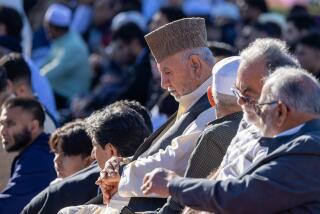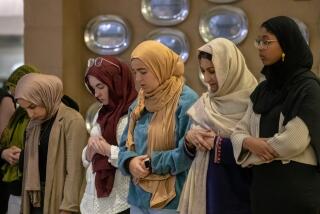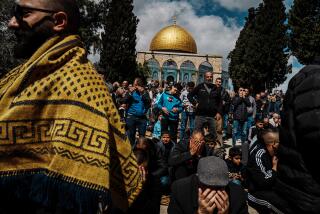Hafiz a Godsend for Mosques
- Share via
Sheik Hamad Ibrahim al Hadaad squeezes one eye shut, leans forward and taps a leathery finger against his skull.
“I am famous for my sharp memory,” he says with a sly grin. “Famous enough to be brought all the way to America.”
The 75-year-old, barefoot Egyptian rests before prayers in his spartan bedroom at the Islamic Center of the Conejo Valley in Thousand Oaks.
Night after night, chapter by chapter, he recites the Koran from memory. His voice, rich and melodious, has made the faithful go weak in the knees and reduced grown men to tears.
“There are no words to describe it, only feelings,” he says. “It’s an act of love -- talking heart to heart with God.”
The sheik is a hafiz, someone who has memorized all 30 chapters of the Koran and spent years perfecting its recitation.
Part literature, part poetry and part song, the haunting voice of the hafiz is the ancient sound of Ramadan, a month celebrating the divine gift of the Koran to Muslims.
But locating a hafiz, which means “protector” in Arabic, is an annual headache for American Muslims. With a relatively short history in the U.S., mosques must fly in their hafizes from places like Egypt, Saudi Arabia, Pakistan, India and Indonesia.
There are only a handful of religious institutions in the country preparing youngsters to become hafizes. One in Sacramento has just 10 students, while individual mosques sometimes run their own programs.
At this rate, Muslim leaders say, it will be another generation before they can readily enlist a home-grown hafiz for Ramadan.
“We are struggling even to teach our children the rudiments of Arabic, so turning them into a hafiz is not going to be easy,” said Mustafa Kuko, director of the Islamic Center of Riverside, which has a Pakistani hafiz. “There is a demand for a hafiz in every mosque; the demand is becoming greater and greater.”
A foreign hafiz gets free airfare and a small stipend along with room and board in a mosque. Each day he leads prayers, and each night he recites the Koran, finishing the more than 400 pages by the end of the month. The recitations are always in Arabic.
“Last year our hafiz was sick, so we had a guy stand in front and read a small Koran,” said Bader Iqbal of the Thousand Oaks mosque. “We had only six people come for prayers, the rest went to other mosques that had a hafiz.”
This year the mosque took no chances, bringing in Sheik Hamad from Cairo and a second hafiz from South Africa.
“You feel closer to God in your prayers when led by someone who has attained the knowledge of the whole Koran,” said Mohamed el Shafie, who attends the mosque. “It humbles you in God’s presence.”
Ramadan, which began about two weeks ago, is an intensely spiritual time of fasting during the day and meditating at night.
By memorizing and reciting the entire Koran, the hafiz is following closely in the footsteps of the Prophet Muhammad and his companions. The word Koran means “the recitation” in Arabic.
“When you hear a hafiz with a good voice, you go into a sort of a trance,” said Amin Refaat, assistant director of the King Fahd Mosque in Culver City, where the hafiz is a Saudi. “It is hair-raising. It revives the divine part of the human, which is the soul, and then releases it through prayer.”
Scholars say that even before the advent of Islam some 1,400 years ago, the tribes of the Arabian Peninsula memorized songs and epic poems, some more than 1,000 lines long. They held contests to determine who could recite with the most eloquence and style.
“The medium for transmitting information was memorization,” said Mohammed Abdul Aleem, who heads Islamicity.com, a Culver City-based Web site that focuses on Muslim news and theology. “When the Koran was revealed to the Prophet Muhammad, he was told to memorize it.”
Every year, competitions are held around the Muslim world to find the best hafiz. Contestants are judged by memorization skills and, more importantly, by their delivery.
Connoisseurs of the art say each culture has its own lyrical style.
They contend that Saudis tend to recite in a faster, more nasal voice, while Egyptians chant in slower, deeper cadences. Turks, they maintain, recite with a calm, almost mystical serenity, while Indonesians are somewhere between Saudis and Egyptians.
But for most Muslims, the hafiz is most remarkable simply for memorizing such a difficult book.
“Historically, they were treated with awe and respect,” said Khalid Abou el Fadl, a hafiz who teaches Islamic law at UCLA. “In villages, the hafiz was often approached for blessings or asked to pray for someone.”
He said a hafiz may earn divine favor, but memorization, especially without comprehension, guarantees nothing.
“It could be a curse in the hereafter if you memorize it and are unethical,” El Fadl said. “Then you have brought dishonor to the Koran.”
There are different methods of training a hafiz, but most start at age 5 or 6.
“Teachers sit all day with them and go over a verse at a time or a page at a time,” said Abdul Rauf Khan, director of Darul Uloom Al Islamiya, a school for hafiz education in Sacramento. “It takes about three years. Younger minds seem to memorize easier.”
Zaid bin Mahmood, 25, is a hafiz from South Africa who has spent Ramadan in mosques in New Orleans, Oklahoma and now in Thousand Oaks. He began memorizing full time when he was 14.
“You do four or five pages a day,” he said. “I worked from 8 a.m. until noon and then 2 p.m. until 5 p.m. every day.”
Memorization is followed by tajweed or “beautification.” The hafiz learns to pronounce words properly, which syllables to stress and which to glide over. It takes about two years.
“I have to read it out loud and do it continuously every day,” Mahmood said. “But one of the miracles of the Koran is, you never get tired of it.”
Back in Thousand Oaks, as evening prayers approach, Sheik Hamad washes his hands, face and feet. He says he recites the Koran daily.
“I can go through the whole thing,” he says. “If I am visualizing what I’m reciting, there will be a lot of power locked in the words.”
The sheik began memorizing the Koran in Tanta, a village in the Nile Delta. In those days, he said, it was not uncommon for children to attend schools, whose sole function was Koran memorization. He went on to become an imam, or leader, of a Cairo mosque.
“The reward I get from God is that I have done a good deed,” he says. “The reward I get from people is respect.”
With that the sheik, in a flowing white gown and skull cap, walks through the gentle arches of the mosque.
Lines of men and women stand on the carpet behind him, facing east toward Mecca. He looks out the window toward the full moon and begins reciting Chapter 18 of the Koran.
“See you not that Allah drives the clouds gently, then joins them together, then makes them into a heap of layers, and you see the rain comes forth from between them,” he chants in Arabic.
There is a poetic quality to his delivery, a lilting repetition that causes some to gently rock and sway in the mosque.
The congregation remains standing, arms folded and eyes closed. In two hours, the hafiz finishes.
Another chapter complete -- just 12 more to go.
*
A video of Ramadan prayers can be seen at www.latimes.com/hafiz.
More to Read
Sign up for Essential California
The most important California stories and recommendations in your inbox every morning.
You may occasionally receive promotional content from the Los Angeles Times.













